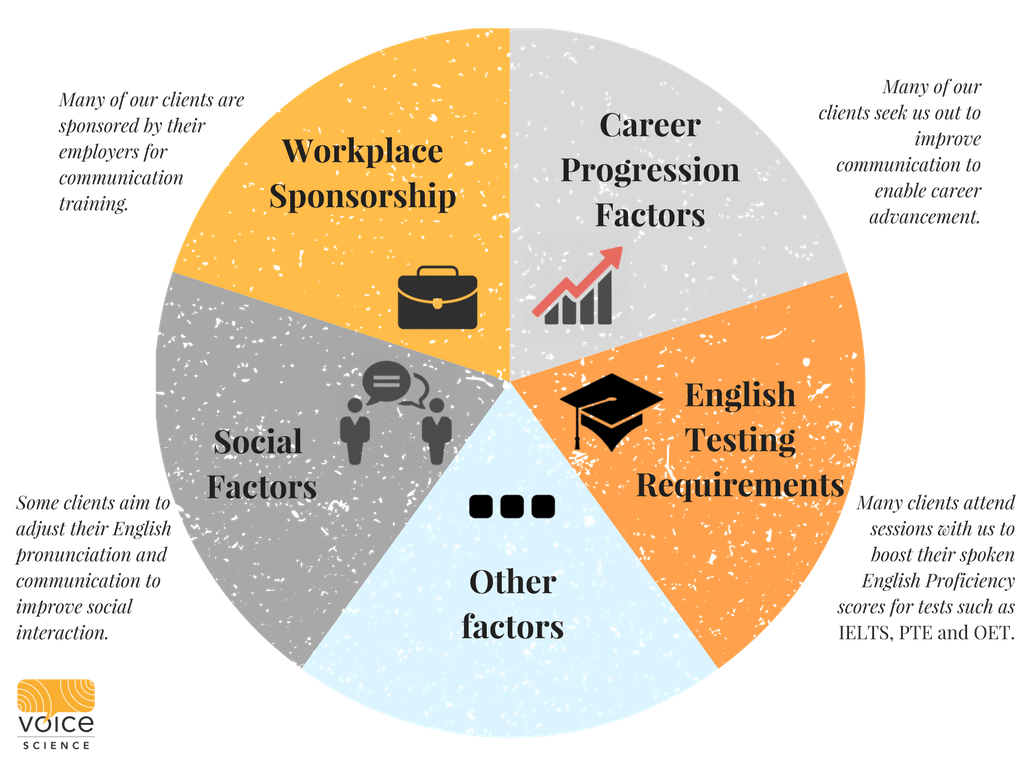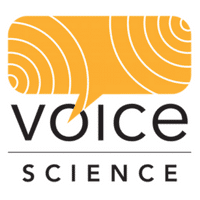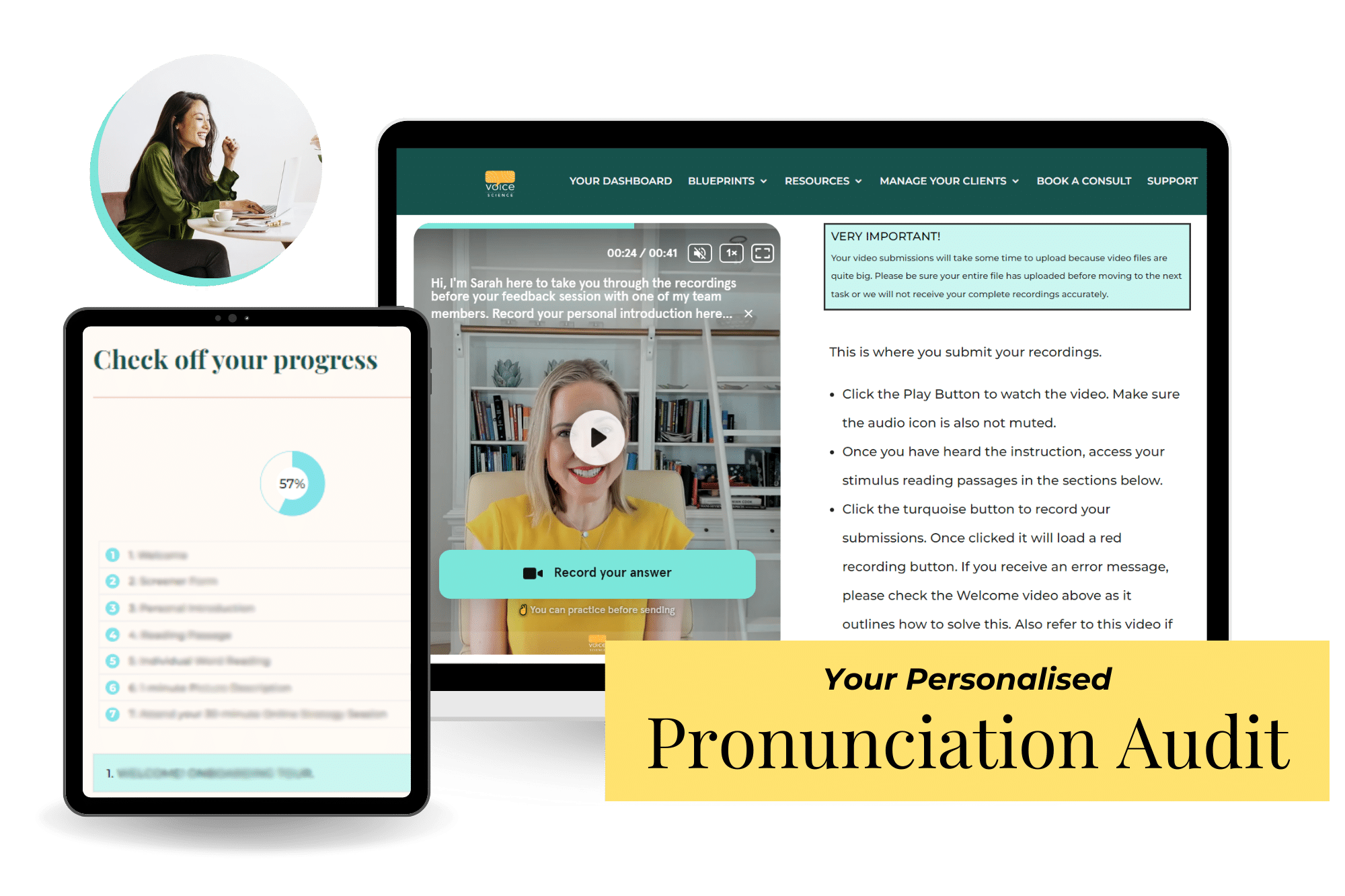Accent or Elocution?
Improving English speaking is a detailed process so it is important to choose the correct approach. This blog compares options for scaling your speaking!

Looking to improve English speaking skills for yourself or your team?
Perhaps you want to sound more confident, command the room, or stop having to repeat yourself.
But how do you determine what approach is best suited: Pronunciation Clarification Sessions or High Performance Communication Sessions (Elocution)?
You may have already read our summaries on our website for each approach, but still feel a little lost. How do you know what session to book an assessment for?
Keep reading, this might help you clarify.
Being a multi-lingual communicator has a whole lot of benefits!
Scope: You can reach a heck of a lot people- more than a monolingual!
Experience: Cross continent knowledge in your field
Perspective: You can probably come up with fresher ideas in your job or business than others.
Even so, despite these winning attributes, barriers will still arise.
Research by Dr Foucart (Social Accent) tells us when the brain is listening to a foreign accent it needs to work harder to understand what is being said.
Frequently, our accent clients are very intelligible.
Yet, communication difficulties are still occurring at work.
How then, do we target these barriers at Voice Science and improve English speaking?

Speaking with confidence
Effective Communication Techniques
This is where the focus is at!
At Voice Science, we use effective communication techniques so you can improve your English speaking. Our goal is to work with you to enhance your communication. Our assessment sessions aim to identify where your communication is breaking down. We then work to build your skills through techniques that suit your current needs.
So back to our original question…
Which Pathway fits You the Best?
Pronunciation Clarification Sessions
Our pronunciation clarification sessions (formerly accent reduction) allow you to train up in the core sounds of English. All instruction is evidence-based.
We want you to increase your total intelligibility when communicating. Everywhere. Especially places that matter. We target specific sounds, words, and phrases based on your needs. You get personalised strategies to speak more effectively.
English pronunciation sessions also let you work on comprehension. You can develop your ability to understand others when they are speaking. This enables you to feel more confident in your communication exchanges. If you want to improve English speaking, don’t forget it’s also important to improve your English listening too.
These programs start first with this service:
High-Performance Communication Sessions
Cadenza’s High-Performance Communication Sessions aim to improve your communication presentation. We provide you with evidence-based strategies to have more impact when communicating.
Our sessions can focus on a range of communication settings including, but not limited to:
- Business meetings,
- Public speaking,
- 1:1 situations,
- Team communication
- Client/ customer strategies
The Following Graph Captures a Few Trends We Notice

So many factors are at play when you head into an accent reduction program or elocution program with to goal of improving English speaking.
At Voice Science™ we emphasise functional and practical communication goals in line with our professional scope as Speech pathologists.
People seek our help with speaking for many reasons.
We will take some time in the lead up to your Diagnostic Accent & Communication Assessment or Elocution & Communication Consultation to learn more about the pain points for you so we can work together towards some practical outcomes.

Choose your own pathway…
At Voice Science we pride ourselves on providing personalised care to our clients. We want you or your team to achieve YOUR goals, not ours. Our aim is for you or your team to walk away with the skills you need to reach your full communication potential. As such, you may find that to do this you need help in both the accent and elocution areas. Or, after completing one of our packages you may feel you have all the skills you required to get you through your current situation.
We are more than happy to discuss with you what option best fits. If you feel you need more information on our services, please contact our team to book in a 1:1 Strategy Call with our Chief Speech Pathologist Sarah. She can talk through your main concerns and assist in helping you choose a pathway that suits you and your team.
See you soon at Voice Science!
Speak with Sarah right now!
If workplace communication is a concern for you or your business team our Pronunciation and Communication programs can assist with fine-tuning communication.
References
- Jiang, X., Gossack-Keenan, K. & Pell, M.D. (2019). To believe or not to believe? How voice and accent information in speech alter listener impressions of trust. The Journal of Experimental Psychology. To believe or not to believe? How voice and accent information in speech alter listener impressions of trust. thevoicescience.com.
- Jiang, X., Sanford, R. & Pell, M.D. (2018). Neural architecture underlying person perception from in-group and out-group voices. NeuroImage, 181, Pages 582-597. Retrieved from https://doi.org/10.1016/j.
neuroimage.2018.07.042.
Further Reading
Accents in the Workplace- Voice Science™
Read one of our blogs on the impact of accents in the workplace.
The Impact of Foreign Accent on social interaction and cognitive processes
This year-long project was coordinated by the Universiteit Gent, Belgium and funded by the European Union with goal of generating solutions “to reduce … social bias” of accent.
We trust people with accents less… unless they speak with confidence.
Monica Torres looks into believability & accent further in this article. A great read on negative and positive bias and accent.
Why do people discriminate against speakers with foreign accents?
Did you know that infants already prefer a native accent to a non-native accent, as early as 5 months old? Accent bias starts surprisingly young. Richard Grey opens the discussion about how our brains have to work harder when we listen to an accent different than our own.


